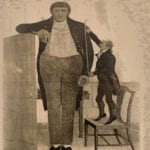 Movies and TV
Movies and TV  Movies and TV
Movies and TV  History
History 10 Extreme Laws That Tried to Engineer Society
 History
History 10 “Modern” Problems with Surprising Historical Analogs
 Health
Health 10 Everyday Activities That Secretly Alter Consciousness
 History
History Top 10 Historical Disasters Caused by Someone Calling in Sick
 Animals
Animals 10 New Shark Secrets That Recently Dropped
 Movies and TV
Movies and TV 10 Forgotten Realities of Early Live Television Broadcasts
 Technology
Technology 10 Stopgap Technologies That Became Industry Standards
 Weird Stuff
Weird Stuff 10 Wild Facts About Taxidermy That You Probably Didn’t Know
 Travel
Travel 10 Beautiful Travel Destinations (That Will Kill You)
 Movies and TV
Movies and TV 10 Box Office Bombs That We Should Have Predicted in 2025
 History
History 10 Extreme Laws That Tried to Engineer Society
 History
History 10 “Modern” Problems with Surprising Historical Analogs
Who's Behind Listverse?

Jamie Frater
Head Editor
Jamie founded Listverse due to an insatiable desire to share fascinating, obscure, and bizarre facts. He has been a guest speaker on numerous national radio and television stations and is a five time published author.
More About Us Health
Health 10 Everyday Activities That Secretly Alter Consciousness
 History
History Top 10 Historical Disasters Caused by Someone Calling in Sick
 Animals
Animals 10 New Shark Secrets That Recently Dropped
 Movies and TV
Movies and TV 10 Forgotten Realities of Early Live Television Broadcasts
 Technology
Technology 10 Stopgap Technologies That Became Industry Standards
 Weird Stuff
Weird Stuff 10 Wild Facts About Taxidermy That You Probably Didn’t Know
 Travel
Travel 10 Beautiful Travel Destinations (That Will Kill You)
10 Real-Life Murders Sung About By The Last People You’d Expect
Plenty of songs throughout the years have been about real-life murders, and most of the performers are exactly the kinds of people you’d expect to focus on murder. Gritty folk singers, goth rockers, hardcore rappers, angry punks, gore-obsessed metalists—these are the usual suspects when the subject is somebody who cruelly took lives away for real.
But sometimes the music world throws us a curveball, handing the murder ballad reins over to some of the gentlest, least threatening acts imaginable. In many cases, you would have no clue the song was so dark unless you actually listened to every word. Even then, you probably wouldn’t believe what you were hearing.
10 Hall And Oates’ “Diddy Doo-Wop” Is About David Berkowitz
David Berkowitz, more popularly known as the Son of Sam, killed six people and injured seven more during a massive crime spree in the late ‘70s. The killings were completely at random, save for Berkowitz’s penchant for murdering brunette women. Also random were his explanations, which included such as gems as blaming his dog for orchestrating the murders.
Also odd was his insistence that Hall and Oates’ soul-pop hit “Rich Girl” helped motivate him to commit murder, despite the fact that the band released the song long after the first batch of murders had taken place. The idea that someone could directly tie their music to a murderer in any way disturbed the band to no end. In response, they did the only thing they could think of—they wrote a song that directly tied their music to a murderer, but on their terms.
The shockingly jaunty 1981 number “Ditty Doo-Wop (I Hear Voices In My Head)” was clearly influenced by both Berkowitz’s attacks and his oddball alibi. Lines such as “Charlie liked the Beatles / Sam, he liked rich girl” can’t really be interpreted any other way. Also, the song makes constant mention of voices in the narrator’s head—which, dogs and blue-eyed soul aside, was clearly the reason Berkowitz decided shooting a baker’s dozen people was a really good idea.
9 Belinda Carlisle Sang About Bonnie And Clyde
Most everybody knows the story of Bonnie Parker and Clyde Barrow, two young people who both loved long walks on the beach, murder, kidnapping, robberies, leading the police on wild interstate manhunts, and puppies. Their reign of terror ended on May 23, 1934 in a hail of gunfire, and their story has inspired many interpretations over the years, from dramatic cinema to cartoon rabbits robbing carrot patches.
As it turns out, it also inspired romantic ballads sung by that one girl from the Go-Gos. In 2007, former lead singer Belinda Carlisle released Voila, a series of French language songs, including “Bonnie et Clyde.” It’s a very breathy, lush, acoustic-driven tale, based on a poem that Bonnie herself had written entitled “The Trail’s End.” Both the poem and song present the duo in a very positive light, with Bonnie being described by Carlisle as “beautiful” in the latter. That’s quite the interesting term to use when describing a unrepentant murderous outlaw.
Interestingly, this song is a cover of a 1968 original performed by French singer Serge Gainsbourg and, of all people, actress Brigitte Bardot. That song romanticized Bonnie and Clyde just as much as Carlisle’s version, proving once and for all that few things are better for one’s public image than being dead.
8 Chad Mitchell Trio Sang About Lizzie Borden
Lizzie Borden is an interesting case of a famous murderer who may have never committed murder. While the jury acquitted her of chopping her parents to death with an axe, the court of public opinion has convicted her many times over in the 120 years since her initial arrest. When schoolchildren jump rope to the tune of “Lizzie Borden took an axe / and gave her mother 40 whacks,” you know you’re not getting your name cleared anytime soon.
Many people have sung about Borden over the years, but few made light of the situation like the Chad Mitchell Trio did. A folk group from the ‘60s, most knew the Trio for timely political satire and not for tales of 70-year-old murder cases. That’s exactly what they did, however, releasing a spectacularly goofy ode to a young woman who might or might not have chopped her parents to death.
In the song, the Trio “admits” that Borden could have been innocent, but they then turn right around and say she was a problem case, because only naughty children chop their parents to bits. In other words, “Yeah, she totally did it.”
7 Cheap Trick’s “The Ballad of TV Violence” Is About Richard Speck
Richard Speck committed all his murders in one day, sneaking into a housing facility for student nurses and stabbing eight of them to death. Authorities apprehended him when a ninth student, who he had completely forgotten about, managed to escape and notify them of what had just happened. The courts ultimately sentenced him to 400 years in prison, just in case he was The Highlander.
Speck was ripe for musical interpretation, including one performed by Cheap Trick, largely known as the ‘70s rock version of a boy band, if all the crazed screaming during “I Want You To Want Me” is to be believed. Before such hysterics, Cheap Trick was actually a rough-and-tumble rock act, whose first album tackled such subjects as pedophilia and suicide. One of these songs was “The Ballad of Richard Speck,” later changed to “The Ballad of TV Violence,” even though neither the song nor the subject has anything to do with TV.
In the song, the narrator who is clearly a stand-in for Speck sings about how he “needs a knife to give [him] a wife” and “a gun to have some fun.” He also sings “I need some rope, it’s my only hope / after 20 or so, I just don’t know,” referencing Speck’s 20-plus arrests prior to the murders. Clearly, Cheap Trick did their homework for this one.
6 Grateful Dead’s “Dire Wolf” Is About The Zodiac Killer
The Zodiac Killer is one of the worst murderers in history, both because of his body count (five documented, dozens more claimed) and because we still don’t know who he was. In fact, we don’t even know for sure if he was a “he.” Other than the fact that somebody committed murders and called themselves the Zodiac Killer, authorities to this day are no closer to discovering their true identity than they were in the 1960s.
Zodiac has inspired many tunes about their rampage, though most musicians waited for their reign of terror to end before immortalizing them in song form. However, the Grateful Dead struck while the iron was hot, recording “Dire Wolf” at the height of Zodiac’s activity in 1969. The song itself is very metaphorical and does not mention Zodiac by nickname, though the refrain of “don’t murder me, I beg of you” makes it clear that trouble is afoot. Moreover, the fact that Jerry Garcia would introduce the song during shows by dedicating it to “that Zodiac cat” erases any doubt as to who the dire wolf truly was.
5 The Rolling Stones’ “Too Much Blood” Is About Issei Sagawa
The case of Issei Sagawa is a sad one—not just because somebody died, but because the murderer brazenly got away with it. Sagawa killed and ate a woman named Renee Hartevelt. Thanks to his ability to feign insanity, plus his father being a wealthy businessman, Sagawa only spent a couple years in psychiatric hospitals and 15 months in jail before being released. He has spent the past 30 years profiting off his crime—writing books, granting interviews, and never once apologizing for the whole “eating a woman” thing that catapulted him to undeserved fame.
In 1980, the Rolling Stones released “Too Much Blood,” a song about the Sagawa saga. While the Stones achieved fame for being a sleazy, sex-obsessed rock and roll band, it’s odd to hear them sing so openly about real-life death and murder. Even odder is how they chose to do it—with a rollicking, upbeat disco number that borders on parody, complete with Mick Jagger telling the story of the crime in rap form between verses. That is, if you want to call that rhythmless, non-rhyming mumbling of his “rapping.”
4 Sufjan Stevens Sang About John Wayne Gacy
John Wayne Gacy is why people fear clowns. The kind, unassuming family man who occasionally dressed up as Pogo The Clown for local children’s parties ended up being a horrific mass murderer, responsible for the kidnapping, rape, and death of at least 33 young boys. Clearly, such a butcher would get a ton of music written about him, usually of the loud and angry variety.
Then you have Sufjan Stevens, a quirky pop singer with song titles like “They Are Night Zombies!! They Are Neighbors!! They Have Come Back from the Dead!! Ahhhh!” Somehow, he was able to drop his goofy sense of humor and write a song about one of the most prolific serial killers in history. “John Wayne Gacy, Jr.” is a shockingly gentle and poignant ballad, one that focuses more on Gacy’s childhood and ability to charm anybody he met than on the few dozen people he tortured to death.
The song ends with the chilling line “And in my best behavior, I am really just like him.” As much as we don’t like to think about it, psychopathic murderers are human and grew up the exact same way of any of us were. They didn’t hatch out of a flaming shell, fully grown and fully evil—at one point or another, they truly were just like us.
3 Blind Melon’s “Skinned” Is About Ed Gein
While Buffalo Bill from The Silence Of The Lambs wasn’t strictly based on a real person, and neither was Norman Bates from Psycho, both can claim Ed Gein as inspiration. As far as the courts were concerned, Gein only committed two murders and was not technically a serial killer. However, his grave robbing, cannibalism, necrophilia, and knack for making lampshades out of human skin and soup bowls out of skulls certainly made him fodder for twisted creative minds.
One such mind was Shannon Hoon, lead singer of ‘90’s alternative band Blind Melon. Known primarily for the gentle “No Rain” and the accompanying music video featuring a little girl dressed as a bee, “Skinned” came quite out of nowhere. It tells the story of Gein from the point of view of the killer himself, featuring various threats of what he will do to his victim’s body parts, such as “I’ll make a shoehorn outta your skin / I’ll make a lampshade of durable skin.”
Musically, this might be the happiest murder song of all time, featuring high-energy guitar strumming and a couple of wacky kazoo solos. This makes it very easy to focus on the skippy tuneage, while dismissing everything the band is actually singing about.
2 Nickelback’s “Throw Yourself Away” Is About Melissa Drexler
Melissa Drexler was not a multiple murderer. She was an 18-year-old girl who gave birth in the bathroom during her prom night, and was desperate to hide that fact from her friends and family. Her sad solution was to strangle her newborn son and dump him in a trashcan so she could focus on what was truly important—returning to the dance floor and having a grand ol’ time with her friends.
After capture, the courts sentenced her to 15 years in prison. She only served three, however, before she was released in 2001. Nobody has seen or heard from her since. Nickelback, of all bands, decided to remind us of her existence with 2003’s “Throw Yourself Away.” Known mainly for alternating between generic arena rock and lady-pleasing pop ballads, Nickelback choosing to sing about a child murderer was very much out of left field.
Subtlety isn’t Nickelback’s forte, and this song is no exception. “Throw Yourself Away” makes it 100 percent clear that this song is about Drexler (“Baby’s born on the bathroom floor / Mother prays that it’ll never cry / And nothing’s wrong, you got your prom dress on / And when they ask, you say ‘It isn’t mine’ ”) and that the band is extremely angry that such a thing could happen. If Drexler’s still around these days, we’re going to assume this song has never once entered her iPod.
1 Harry Chapin’s “Sniper” is About Charles Whitman
Charles Whitman was a former Marine who, during a fit of psychosis in 1966, killed his wife and mother. He then grabbed his sniper rifle, climbed to the top of a tall tower, and began picking off random people. Before authorities could subdue him, he had killed 16 people and injured far more. He served no prison time, as officers shot and killed him on the spot. An autopsy revealed a surprising discovery—a brain tumor that may or may not have had a hand in his sudden madness.
That one piece of evidence was apparently enough to gain the sympathy of Harry Chapin. The “Cat’s in the Cradle” scribe shocked everybody with his 1972 ballad “Sniper,” which doesn’t so much account Whitman’s rampage as it completely romanticizes it. The song is less about how Whitman killed 16 people and more about how nobody ever respected or paid attention to him. He even sings about how he hated his mother for ignoring him, which appears to be untrue. Chapin even describes the cops who shoot Whitman down as laughing about how they just killed a man, which was almost certainly not the case.
The public almost universally hated the song, given that it places the blame for a mass shooting on literally everybody but the mass shooter. That negative reaction goes a long way towards explaining why Chapin never again wrote about psychotic murderers with imaginary mommy issues.
Jason Iannone is a Cracked columnist and freelance editor who can’t possibly be the only one out there who remembers Bunny And Claude. Join him at Facebook, Twitter, and Tumblr to wax nostalgic about cartoons so flimsy the joke died after two episodes.








